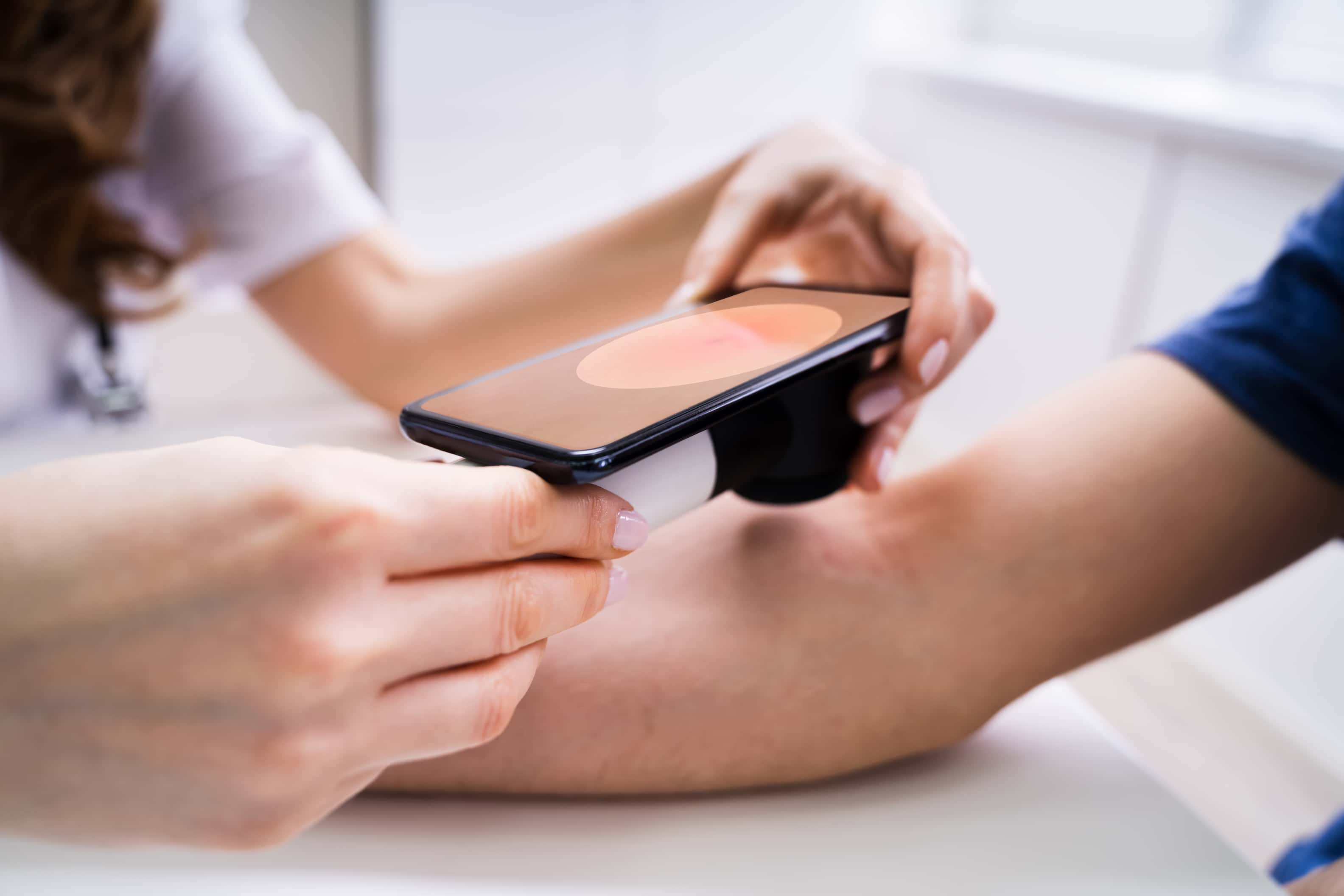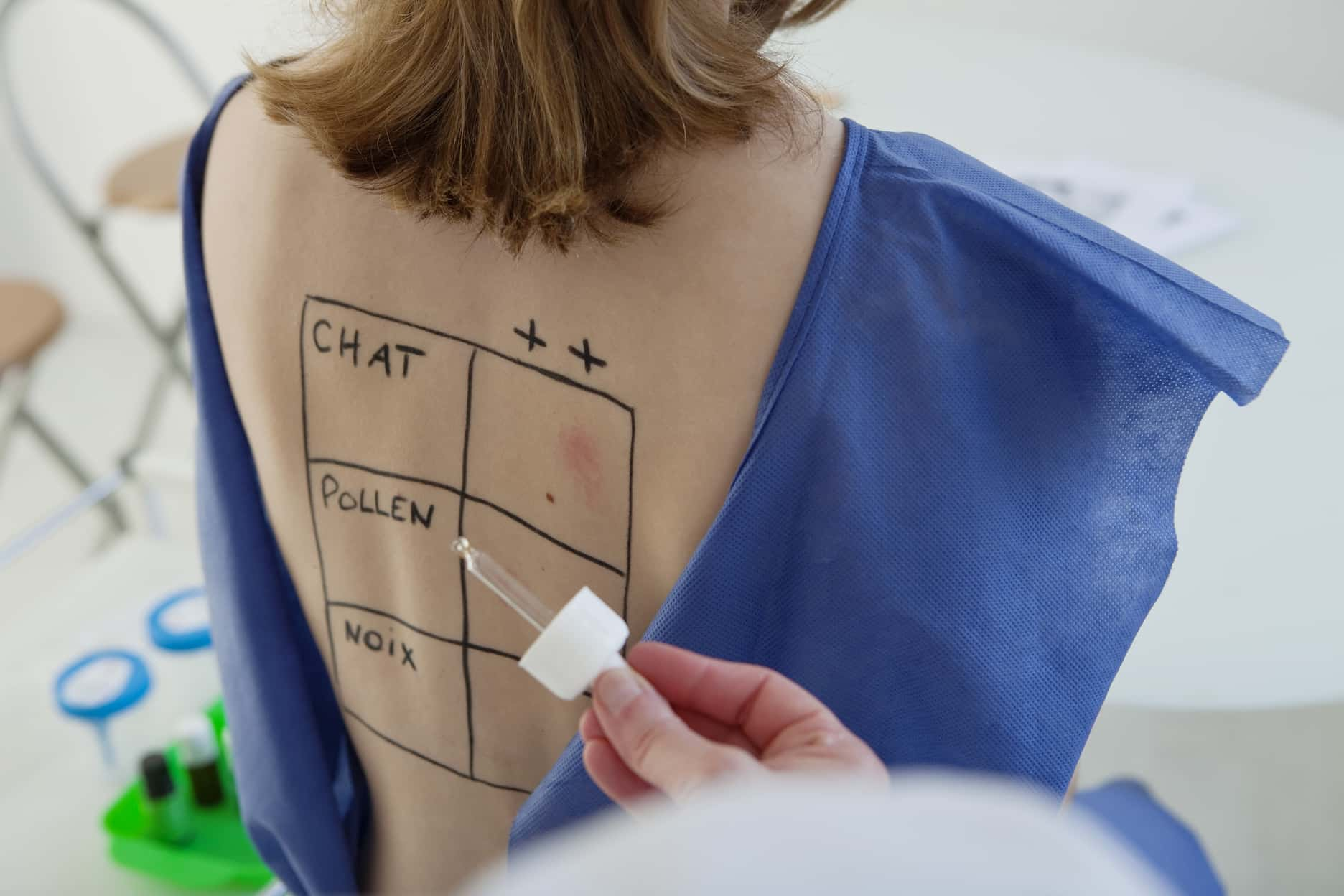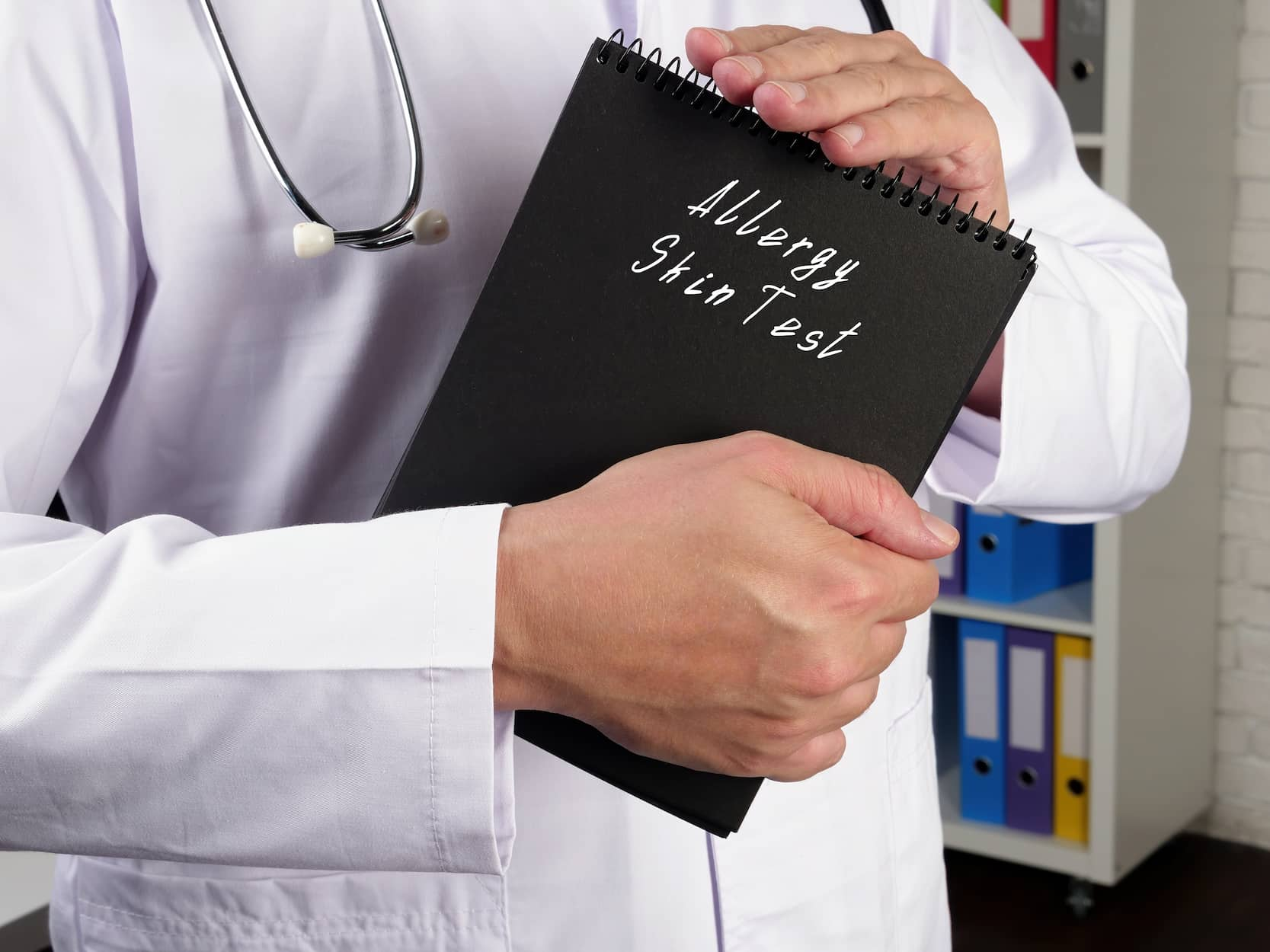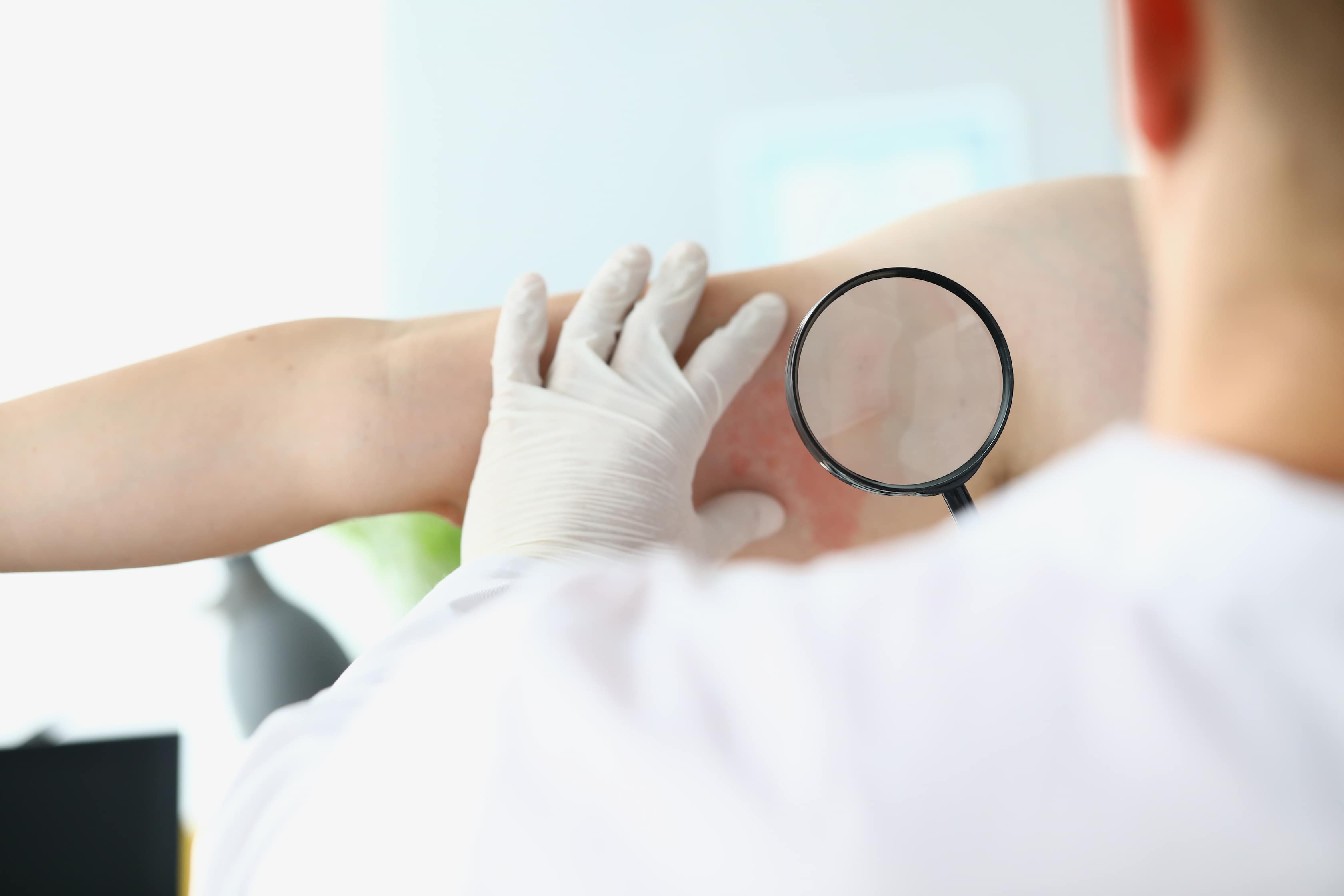Allergy Skin Test in Turkey
Healthy Türkiye helps you find the best allergy skin test in Turkey at affordable prices and adopts a 360-degree service approach in all areas of health through affiliated hospitals.
- Medical Treatment
- Medical Check-Ups in Turkey
- Colonoscopy in Turkey
- Vision Checkup in Turkey
- Electrocardiogram in Turkey
- General Check-Up in Turkey
- Hearing Screening Test in Turkey
- Allergy Skin Test in Turkey
- Gynecological Exam in Turkey
- Prostate Cancer Screening in Turkey
- Skin Cancer Screening in Turkey
- Stress Test in Turkey
- Bone Density Test in Turkey
- Diabetes Risk Test in Turkey
- Executive Check-Up in Turkey
- Gastroscopy in Turkey
- Sleep Lab in Turkey
- Homepage
- Medical Treatment
- Allergy Skin Test in Turkey

About Allergy Skin Test in Turkey
Allergy skin testing is the gold standard in Turkey and is used along with the medical history to find out exactly what things a person is allergic to. Allergy skin tests give fast results and generally cost less than allergy blood tests. On the other hand, while testing may seem simple, it must be carried out by trained practitioners with an understanding of the variables and risks of the testing procedure. The skill of the tester can also affect the accuracy of the results. Healthy Türkiye ensures that your allergy skin test is done by experts in Turkey. The results of your allergy skin test in Turkey are always reliable and under the guarantee of Healthy Türkiye.
The allergy is an overreaction, also known as hypersensitivity, of the body’s immune system. Normally, the immune system works to fight off foreign substances like viruses and bacteria. When you have an allergy, the immune system treats a harmless substance, like dust or pollen, as a threat. To fight this perceived threat, the immune system reacts and causes an allergic reaction. Signs of an allergic reaction can range from sneezing and a stuffy nose to a life-threatening condition known as anaphylactic shock.
As Healthy Türkiye, we have a team of highly trained consultant dermatologists, who have completed specialist training in dermatology and are on the specialist register of the general medical council. All our consultants hold substantive contracts with the best dermatology centers in leading Turkey hospitals. Therefore, you can be certain of the highest quality specialty care.
We provide a range of treatments and can offer one, or a combination of treatments to achieve the best results. And in Turkey we can offer diagnosis and treatment all under one roof by expert consultant dermatologists, so you know you’ll be in safe hands.

Allergy Skin Test Turkey
During allergy skin tests in Turkey, your skin is exposed to suspected allergy-causing substances (allergens) and is then observed for signs of an allergic reaction. Information from allergy tests may help the doctor develop an allergy treatment plan that includes allergen avoidance, medications, or allergy shots ( immunotherapy ). In Turkey, allergy skin tests are widely used to help diagnose allergic conditions, including hay fever (allergic rhinitis), allergic asthma, dermatitis (eczema), food allergies, penicillin allergy, and bee venom allergy. Allergy skin tests are usually safe for adults and children of all ages, including infants. In certain circumstances, though, allergy skin tests aren’t recommended.
You may be so sensitive to certain substances that even the tiny amounts used in allergy skin tests could trigger a life-threatening reaction (anaphylaxis). If you take medications that could interfere with test results, allergy skin tests aren’t recommended. These are antihistamines, many antidepressants, and some heartburn medications. The doctor may determine that it’s better for you to continue taking these medications than to temporarily discontinue them in preparation for an allergy skin test.
If severe eczema or psoriasis affects large areas of skin on your arms and back, especially the usual testing areas, there may not be enough clear, uninvolved skin to do an effective test. Other skin conditions, such as dermatographism, can cause unreliable allergy test results.
At Healthy Türkiye we work with dermatologists who are leading skin experts with in-depth knowledge of how IPL can be used to improve the appearance of the skin. We recommend IPL treatments in Turkey to patients with thread veins, rosacea, and bothersome skin flushing to reduce redness, restoring the skin tone to more closely match the surrounding normal skin.
Blood tests can be useful for those who shouldn’t or can’t undergo allergy skin tests. But, blood tests aren’t used for penicillin allergy.
Generally in Turkey, allergy skin tests are reliable for diagnosing allergies to airborne substances, such as pollen, pet dander, and dust mites. Allergy skin testing also may help diagnose food allergies. But because food allergies can be complex, you might need additional tests or procedures.

We Care About Your Health
Healthy Türkiye provides the best for your health and comfort. You will feel privileged with us.
7/24 Quality Personal Assistance Throughout Your Journey
Customizable for You All-Inclusive Packages
Get the Right Advice for your Health
Types of Allergy Skin Test in Turkey
There are several different types of skin tests used by the Turkish medical community in the diagnosis of allergies. Each of these tests comes with its own advantages and disadvantages. Some tests are better for assessing certain conditions while other tests are a better fit for certain patients. Some conditions, too, including food allergies, are more diagnostically complex and might require additional testing beyond just a skin test. Determining which test is the best option for you should be done in close consultation with the doctor or allergist.
Skin Prick Test (SPT) in Turkey
The skin prick test (SPT) is the most common kind of skin allergy test doctors use to diagnose allergies. In Turkey, skin tests can be the most accurate and least expensive way to confirm allergens. SPT is a simple, safe, and quick test, that gives results within 15-20 minutes. Generally, doctors carry out the skin prick test on the inner forearm, but in some circumstances, they may also carry it out on another part of the body , such as the back. The doctor selects the skin test allergens after examining you. Just 3 or 4 or up to about 25 allergens can be tested.
Firstly, the doctor places a small drop of the possible allergen on the skin. After, they will then prick the skin with a lancet through the drop. If you are sensitive to the substance, you will develop a localized allergic response, in the form of swelling redness, and itching at the site of testing within 15 minutes. Generally, the larger the wheal, the more likely you are to be allergic to the allergen. The skin prick test can be carried out on all age groups, including babies.
Intradermal Skin Test in Turkey
In Turkey, an intradermal skin test involves the injection of a small amount of allergen into the skin. After, the allergist observes the injection site for a reaction to the substance. Commonly, the intradermal test is used to confirm if a patient is allergic to penicillin or insect venom. Moreover, it can be a useful tool in diagnosis when a skin prick test comes up negative but the allergist still suspects that the patient is allergic to the tested allergen.
In Turkey, it’s one of the quickest allergy skin tests since it typically takes no more than 20 minutes to observe a reaction. It does, however, involve injections into the skin and, as such, may not be the best choice for some patients, including children. This test is often used to identify allergies to bee stings and other insect venoms, or penicillin.
Patch Test in Turkey
A skin patch test is most commonly used in the diagnosis of contact allergy dermatitis to determine what substance the skin is reacting to in Turkey.
The process is relatively straightforward. The allergist adheres rectangular strips containing common allergens to the back of a patient. The patches remain in place for two days, at which point the patient returns for assessment after two days. The allergist removes the patches and looks to if the skin has had a reaction to any allergen. This procedure is repeated a few days later to see if the patient has any delayed reactions to allergens.
The disadvantage of a patch test is that it takes longer and a patient must avoid showering or exercising during the entire testing process. The advantage of this test is that it can confirm allergy triggers and help develop a concise treatment plan for dermatitis.
The doctor may offer to do an allergy blood test along with the skin allergy test. This test measures the levels of antibodies in your blood. The levels of antibodies might be elevated if a person is allergic to the substance. A blood test able to also be done if a person cannot have a skin test. Healthy Türkiye will choose the right allergy skin test for you with its expert staff.
During the Allergy Skin Test in Turkey
What you can expect during the turkey allergy test will vary depending on the type of test you are having.
During the Prick Test in Turkey
Small amounts of the suspected allergens are placed on the skin of the forearm, upper arm, or back. These spots are then pricked with a tool so the allergen goes just under the skin. In order to help interpret your reaction to suspected allergens, additional substances are placed on the skin to visualize how a positive and negative reaction might look. A drop of a solution with no allergens is used to show how a negative reaction will appear on the skin. This drop of solution with a histamine solution that commonly causes an immune response is used to show a positive reaction.
After 20 minutes, the doctor will check the testing area and compare any reactions against the control group. Positive reactions exhibit a wheal, or small bump, surrounded by a flare, which is a well-defined red site. The doctor may measure the wheels because they should be 3 to 5 mm larger than the control to be considered positive.
There is a small chance of a serious life-threatening side effect called anaphylaxis, which is a severe whole-body reaction to an allergen. Anaphylaxis requires immediate medical attention, which is why it is important that testing be performed under medical supervision by an expert.
During the Intradermal Test in Turkey
Very small amounts of allergens are injected directly under the skin rather before being placed on it and then pricked. The testing site is checked after 20 minutes for any reactions such as redness or swelling.
The immediate side effects of intradermal skin tests are very similar to prick tests, including some pain at the time of injection and redness and itching during the test. While it is still a rare occurrence, the risk of anaphylaxis is greater with intradermal testing because a concentration of allergy substances is used.
During the Patch Test in Turkey
Patches with a small amount of the suspected allergens are taped on the skin of the back or upper arms for 48 hours. At the later visit, the patches will be removed and the test sites checked for any reaction, such as a red or itchy rash. Because it can take several days for reactions to develop, a third visit generally occurs 72 to 96 hours after the application of the patches. During the patch test, you will be asked to avoid getting the testing site wet, including through bathing or sweating.
Prepare for an Allergy Skin Test in Turkey
Before having an allergy skin test in Turkey, discuss the advantages, disadvantages, long-term risks, and consequences associated with the test with your doctor. Be sure you completely understand what will happen and are comfortable with your doctor’s answers to your questions.
You may need to stop taking certain drugs before the allergy skin test in Turkey. These are generally antihistamines and antidepressants. The healthcare provider will let you know which drugs to avoid before your test and how long to avoid them. Antidepressants and antihistamines do not have any effect on an allergy blood test. Tell the healthcare provider or prescriber about all prescription, over-the-counter, and herbal medications that you are taking. Also, tell them about any drug allergies and medical conditions that you may have. Drugs that can interfere with skin tests include:
Prescription antihistamines, such as hydroxyzine (Vistaril).
Over-the-counter antihistamines, such as loratadine (Claritin, Alavert), diphenhydramine (Benadryl), chlorpheniramine, cetirizine (Zyrtec Allergy) and fexofenadine (Allegra).
Tricyclic antidepressants, such as nortriptyline (Pamelor) and desipramine (Norpramin).
Certain heartburn medications, such as cimetidine (Tagamet) and ranitidine.
The asthma medication is omalizumab (Xolair). This medication may disrupt test results for six months or longer even after you quit using it. For comparison, most drugs affect results for days to weeks.
There is no food or drink restrictions before going for an allergy skin test.
If your child is being tested, the healthcare provider may apply a numbing cream to his or her skin before the test.
To prepare for a skin allergy test in Turkey, avoid applying any creams, lotions, or perfumes to the test area on the day of the test. Patients with excess hair in the testing site will also need to shave the testing site.
When Should I Get Allergy Skin Testing in Turkey?
In Turkey, allergy skin tests are performed to identify what allergen is causing allergy symptoms so that people can avoid the trigger if necessary and plan appropriate treatment. There are many allergens, including foods, medications, environmental substances, as well as contact allergens that irritate the skin. Testing may be necessary for people with potentially serious allergic reactions or asthma.
The doctor may order allergy testing when they believe you to be allergic to one or more substances. This is indicated by your medical history along with the following signs observed during a physical exam:
Hives or skin rashes
Hay fever or a runny nose
Asthma
Red, watery eyes
Itchy eyes nose and throat
Chest congestion, coughing, or wheezing
Vomiting
Diarrhea
Severe reactions to insect stings
If you’re allergic to allergens in the air like dust, pollen, or pet dander, you might develop allergic rhinitis. Food allergy signs typically occur within 30 minutes of food ingestion but may occur up to two hours after ingestion. Also, people who are allergic to latex, fragrances, or metals like nickel may develop contact dermatitis. This allergic reaction affects the skin. You may have signs such as a burning sensation on the skin or blisters, hives and swelling, and skin rash or itchy skin. A patch test, performed by an expert provider, is used to diagnose these types of reactions.
At Healthy Türkiye, we offer one of the most comprehensive and quick turkey allergy test services available with all our tests carried out in our pathology department. By choosing Healthy Türkiye you’ll get a more complete, compassionate kind of care from pre-admission, right through to aftercare and follow-up. Contact Healthy Türkiye today to start your treatment journey and get back to living the life you love.
What Happens If I Have an Allergy?
In Turkey, with test results that identify your allergens and a health plan to help you take control, you’ll be able to reduce or eliminate allergy symptoms. Depending on the allergy, Healthy Türkiye healthcare provider might recommend one or more of these steps:
Avoid exposure to allergens: Avoid ones that cause reactions, such as latex or certain foods.
Take daily allergy drugs: Antihistamines can prevent or reduce allergic rhinitis and other signs.
Get allergy shots: This kind of immunotherapy can decrease the immune system’s response to certain allergens like pet dander. You should get allergy shots for four to five years to experience maximum benefit. Allergy shots can be costly, but they usually provide long-lasting relief, even after the shot series is completed.
Should have a medical alert card: A medical alert card lets others know about your severe allergy. It tells them you could have an anaphylactic response to peanuts, bee stings, or other allergens.
Carry an epinephrine injection (EpiPen): Keep this injection with you at all times if you’re at risk of an anaphylactic allergic reaction.

2026 Cost of Allergy Skin Test in Turkey
All types of medical attention like allergy skin tests are very affordable in Turkey. Many factors are also included in determining the cost of allergy skin tests in Turkey. Your process with Healthy Türkiye will last from the time you decide to have an allergy skin test in Turkey until the time you are fully recovered even if you are back home. The exact allergy skin test procedure cost in Turkey depends on the type of operation involved.
The cost of allergy skin tests in Turkey does not demonstrate many variations in 2026. Compared to costs in developed countries like the United States or the UK, allergy skin test costs in Turkey are relatively low. So, it’s no wonder patients from across the world visit Turkey for allergy skin test procedures. However, the price is not the only factor affecting choices. We suggest looking for hospitals that are safe and have allergy skin test reviews on Google. When people decide to seek medical help for an allergy skin test, they will not only have low-cost procedures in Turkey, but also the safest and best treatment.
At clinics or hospitals contracted with Healthy Türkiye, patients will receive the best allergy skin test from specialist doctors in Turkey at affordable rates. Healthy Türkiye teams to provide medical attention to allergy skin test procedures and high-quality treatment to patients at a minimum cost. When you contact Healthy Türkiye assistants, you can get free information about the cost of allergy skin tests in Turkey and what this cost covers.
The cost of an allergy skin test in the UK is between £150-£200.
The cost of an allergy skin test in the USA is between $100-$300.
The cost of an allergy skin test in Turkey is between $50-$60.
Price of Allergy Skin Test in the UK
Price of Allergy Skin Test in the USA
Price of Allergy Skin Test in Turkey

Why Choose Turkey for an Allergy Skin Test?
If you decide to have your test with Healthy Türkiye in Turkey, you’ll be cared for by an experienced multi-disciplinary team who understand what you’re feeling and are dedicated to your well-being. Your allergy tests will take place in one of our modern, well-equipped hospitals. All patients can gain rapid access to the latest-generation testing and medical treatments. We can organize additional care should you need further treatment afterward.
Turkey is one of the top destinations for health tourism. Nowadays, thousands of patients from various countries travel to this country for medical procedures. There are many reasons that can be attributed to the fame and popularity of the best hospitals in Turkey. The Turkish hospital healthcare provider is well-trained in services to international patients.
You can be sure, they are very helpful to all the patients. The top health centers in Turkey have healthcare infrastructure and are equipped with the most updated versions of the latest modern technology in medicine. Also, there are many nationally and internationally accredited hospitals and clinics in Turkey that are renowned medical centers. Several of these are teaching hospitals, linked to Universities or research centers, and ensure evidence-based care.
One of the major benefits of traveling to Turkey for treatment is the cheap prices. International patients from Western countries may save 70% on treatment and world-class hospitals ensure they don’t have to compromise on quality. In Turkey, allergy skin tests are primarily done by allergists, who are physicians that have specialized training in identifying and managing allergies and other immune disorders. Testing is performed after a physical exam and discussion of your history of symptoms. With test results that identify your allergens and a treatment plan to help you take control, you’ll be able to reduce or eliminate allergy signs and symptoms, with Turkish expert doctors.
At Healthy Türkiye, we are committed to delivering excellent individual care and customer service across our network of hospitals, clinics, and specialist care centers around Turkey. Our dedicated and highly trained team aims to achieve consistently excellent results.
All-Inclusive Package for Allergy Skin Test in Turkey
Healthy Türkiye offers all-inclusive packages for allergy skin tests in Turkey at much lower prices. Extremely professional and experienced doctors and technicians carry out high-quality allergy skin tests. The cost of allergy skin tests in European countries can be quite expensive, especially in the UK. Healthy Türkiye provides cheap all-inclusive packages for a long and short-stay of allergy skin tests in Turkey. Because of many factors, we can provide you with many opportunities for your allergy skin test in Turkey.
The price of allergy skin tests differs from other countries due to medical fees, staff labor prices, exchange rates, and market competition. You can save much more on allergy skin tests compared to other countries in Turkey. When you purchase an allergy skin test all-inclusive package with Healthy Türkiye our healthcare team will present hotels for you to choose from. In allergy skin test travel, you will have the price of your stay included in the all-inclusive package cost.
In Turkey, when you purchase allergy skin test all-inclusive packages through Healthy Türkiye, you will always receive VIP transfers. These are provided by Healthy Türkiye, which is contracted with highly qualified hospitals for allergy skin tests in Turkey. Healthy Türkiye teams will organize everything about allergy skin tests for you and have you picked up from the airport and safely brought to your accommodation. Once settled in the hotel, you will be transferred to and from the clinic or hospital for an allergy skin test. After your allergy skin test has been successfully completed, the transfer team will return you to the airport in time for your flight home. In Turkey, all packages of allergy skin tests can be arranged upon request, which relaxes the minds of our patients. You can reach out Healthy Türkiye for everything you need to know about allergy skin test in Turkey.
The Best Hospitals in Turkey for Allergy Skin Test
The best hospitals in Turkey for allergy skin test are Healthy Türkiye, Memorial Hospital, Acıbadem International Hospital, and Medicalpark Hospital. These hospitals attract patients from all over the world seeking allergy skin test due to their affordable prices and high success rates.
Best Doctors and Surgeons in Turkey for Allergy Skin Test
The best doctors and surgeons in Turkey for allergy skin test are highly skilled professionals who offer specialized care and advanced procedures. With their expertise and state-of-the-art techniques, these specialists ensure that patients receive high-quality allergy skin test and achieve optimal health results.

Frequently Asked Questions
The most common side effect of allergy skin testing is slightly swollen red bumps and hives. These side effects should go away within a few hours. On rare occasions, the skin test can produce a severe allergic reaction called anaphylaxis.
Hydrocortisone cream.
The skin is observed closely for symptoms of a reaction, which generally includes swelling and redness of the site. With this test, several suspected allergens can be tested at the same time, and results are usually obtained within about 15-20 minutes, in Turkey.
Allergy skin test results are reported as positive or negative. If there is an immune reaction to a potential allergen, that is considered a positive. If not, then the test result is negative, which may indicate the patient doesn’t have an allergy to that substance.
You should have something to eat before testing. Also, you should avoid sunburn prior to skin testing. Certain drugs interfere with an accurate skin test and should not be taken before testing.
In Turkey, an allergy skin test is considered a very safe procedure. The frequency of systemic reactions caused by extracts of inhalant allergens is extremely low.
Positive results are indicated by a wheal that is a raised white bump surrounded by a small circle of itchy red skin. If no wheal appears, it is unlikely that you are allergic.
